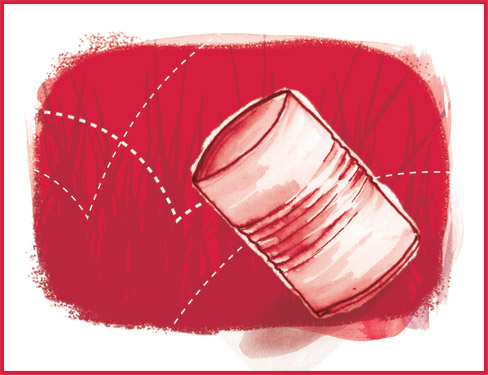Tired Tropes: Kickin’ that Can
The problem with the ever popular complaint about kickin' the can down the road.
 I keep seeing people criticizing various proposals on fiscal policy to be problematic because they “kick the can down the road” which means seems to mean that since many of the cuts/adjustments will take place in the future that they cannot be taken seriously. I have no problem with skepticism, but I would make a simple observation: since it is impossible to do everything right now, any plan will have to be predicated on future adjustments. As such, can kicking is inevitable.
I keep seeing people criticizing various proposals on fiscal policy to be problematic because they “kick the can down the road” which means seems to mean that since many of the cuts/adjustments will take place in the future that they cannot be taken seriously. I have no problem with skepticism, but I would make a simple observation: since it is impossible to do everything right now, any plan will have to be predicated on future adjustments. As such, can kicking is inevitable.
Indeed, let’s say that our goal is to actually pay down the national debt. Even if we had a credible plan to do so, it couldn’t be done immediately. As such, can meet foot and then meet road.
Of course, part of the reason for the dislike of can-kicking is the not unreasonable concern that the can will be ever kicked on and on, down the road where it began and never, well, be picked up and recycled (or whatever it is one does with cans once the kicking stops).
Recognizing that anything set up for the future can be changed (pretty much by definition) as a current congress is limited in the ways it can bind future congresses. Indeed, ultimately, an existing congress cannot forestall a determined future congress from undoing whatever is passed in the now. Of course, current congresses can make it difficult for future congresses to act. If a current congress creates a situation that it knows will be politically difficult for a future Congress, it may well bind (or limit) future activity.
Two easy examples:
1) Entitlement programs. The basic design of our entitlement programs have been long-established and the basics of the program are more or less automatic in nature—i.e., they do not require annual votes. To change that process requires specific legislative action (to redefine, for example, who qualifies for Food Stamps or Medicaid). Since these tend to be politically difficult votes, current congresses tend to abide by what past congresses have mandated.
2) The Bush tax cuts. The very design of the Bush tax cuts contained a sunset provision (i.e., they automatically expired after a decade). Now, this meant that Congress at the end of that legislative rainbow would be accused of raising taxes if it let the Bush cuts expire. And, what happened in 2010 when the cuts were about to go away? The Democratically controlled congress extended them, so as not to be “raising taxes in a recession.” Similar logic will accrue when they next hit their expiration date.
As such, while it is technically true that current Congresses cannot fully bind their future colleagues, it is possible to heavily influence their behavior.
And, moreover, since the debt (or, even, annual deficits) were not created overnight, and therefore no solution (even the bestest of ones) will not unfold overnight.
I will say this, the can not even being kicked (i.e., is mostly being ignored by the political class*) is health care inflation as that is where we have real future problems. That and the notion that one can deal with long-term fiscal problems by focusing non-defense, discretionary spending .
One more general observation on the can-kicking issue: the logic that one cannot trust current deals because they might be altered in the future applies to all laws, if you stop and think about it. However, no one argues that well, why bother passing law X, because some future Congress could come along and change it. However, this is always the case.
—
*Perhaps no one is even kicking that one because it is currently one big can of fiscal whoopass.






dingdingdingdingding… We have a winner!
It’s also possible that the kicker is avoiding it because he’s going to get all sorts of unmentionable stuff all over him were he to kick it. We know what the label on the can says. How closely does it portray the actual contents?
As I recall, it was another “hostage” situation, where the Republicans were threatening to withhold funding for unemployment benefits, unless they got a deal that included the extension of the Bush tax cuts at the highest income levels.
Hardly a situation that can be described as “the Democratically controlled congress extended them”.
Whether you think extending them was good or bad, you should acknowledge that it was the Republicans who should get credit for that.
On the topic of kicking the can, it has long been a “matter of faith” on the conservative side that Democrats promise cuts to social services and never deliver them. My understanding is that this happened under Regan (while O’Neill was Speaker).
Are there any good sources that document other times where Democrats promised cuts as part of legislation that never materialized?
Yes it is true that when you spend years creating a big pile of manure that it is unreasonable to think you can do away with it overnight. However saying that you can’t do it overnight, taking a few small shovel load off while putting several more large buckets load on, then promising to get serious about it sometime in the future is kicking the can down the road.
Nobody is expecting to get rid of the whole pile of manure (debt and\or deficit) overnight but we do want “serious” efforts in addressing the problem. The first part is to stop the pilling on part. After that then you can start on reducing the actual pile.
There is no effort to reduce the debt and very little in reducing the deficit that is increasing the debt. The attitude seems to be “it’s too hard!!!”, “I don’t want to”, “I will clean my room tomorrow”, etc. They think they are “grownups” because they wear big boys panties when in fact they are acting like a bunch of barely potty trained children.
So yes people are using the term “kicking the can down the road” because that is exactly what they are doing.
Since there is almost no cuts in the first two years, then it should be obvious to everyone that Congress will not cut spending in the current budget year but just keep promising to cut budgets in the out years. Since Congress can only cut spending by cutting programs, it should be very obvious that Congress has zero interest of cutting spending and has no plan to cut spending in the future.
Thus, every private sector business should be able to anticipate that spending will be maintained and that taxes will go up in the future to fund interest payments if nothing else.
Once again, the current budget deal should be seen as a bad omen for the private sector. If companies are going to expand, they will be looking outside of the U.S. Of course, they will not be looking at the other drunken spending countries like Greece, Italy, Spain, Ireland, or England.